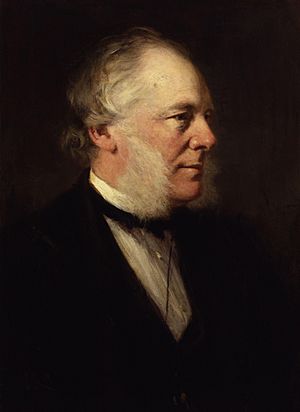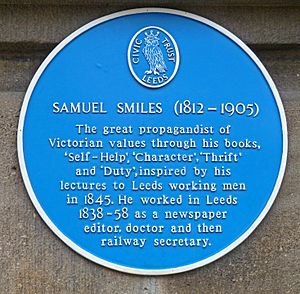Samuel Smiles facts for kids
Quick facts for kids
Samuel Smiles
|
|
|---|---|

Portrait by Sir George Reid
|
|
| Born | 23 December 1812 Haddington, East Lothian, Scotland
|
| Died | 16 April 1904 (age 91) Kensington, London, England
|
| Alma mater | University of Edinburgh |
| Known for | Biographies and self-help books |
|
Notable work
|
Self-Help |
Samuel Smiles (born December 23, 1812 – died April 16, 1904) was a British writer and government reformer. He believed that people could make more progress by changing their attitudes than by just changing laws.
His most famous book, Self-Help (1859), encouraged people to be careful with their money (thrift). It suggested that poverty often came from bad habits. The book also spoke against loving money too much and against the idea of "laissez-faire" government, which means letting things happen without much control. Self-Help was very important in British political thinking for a long time.
Contents
Early Life and Learning
Samuel Smiles was born in Haddington, East Lothian, Scotland. He was one of eleven children. His family was very religious, but Samuel himself did not follow their strict practices.
He went to a local school and left when he was 14. He then started training to be a doctor. This helped him study medicine at the University of Edinburgh in 1829. There, he became very interested in politics and supported a politician named Joseph Hume.
Samuel's father died in a serious illness called the 1832 cholera epidemic. But Samuel's mother supported him so he could keep studying. She ran their small family store and worked very hard. Her example of hard work greatly influenced Samuel's life.
In 1838, Samuel was asked to be the editor of a newspaper called the Leeds Times. He lived in Leeds for the next twenty years.
Working for Change
In 1837, Samuel wrote articles for newspapers like the Edinburgh Weekly Chronicle. He pushed for changes in how Parliament worked. In November 1838, he became the editor of the Leeds Times and stayed in that job until 1842.
In 1840, Samuel became a secretary for a group called the Leeds Parliamentary Reform Association. This group supported Chartism, a movement that wanted six main changes:
- All men over 21 should be able to vote.
- Voting areas should be equal in size.
- People should vote in secret.
- Members of Parliament (MPs) should not need to own land to be elected.
- MPs should be paid for their work.
- Elections for Parliament should happen every year.
As editor, he supported many big changes, like women being able to vote and free trade. But by the late 1840s, Samuel worried about some Chartists who suggested using force. He felt that simply changing laws wouldn't fix all of society's problems.
On December 7, 1843, Samuel married Sarah Ann Holmes Dixon in Leeds. They had three daughters and two sons.
In 1845, he left the Leeds Times and started working for railway companies. He worked for the Leeds & Thirsk Railway and later for the South Eastern Railway.
In the 1850s, Samuel decided that people helping themselves was more important than political changes. In 1859, he published his famous book, Self-Help; with Illustrations of Character and Conduct.
Samuel Smiles's Writings
Samuel Smiles wrote articles for a magazine called the Quarterly. He believed that railways should be owned by the government and that cheaper tickets for third-class passengers should be encouraged.
In 1861, he published an article called Workers Earnings, Savings, and Strikes. He suggested that poverty often came from people not being careful with their money. He wrote about a worker who earned a good salary but lived in a small, messy home because he was "careless."
In 1866, Samuel became the president of a group called the National Provident Institution. He left in 1871 after having a stroke, which made him very weak.
In 1875, his book Thrift was published. In this book, he said that being rich doesn't make someone special. He also criticized the idea of "laissez-faire" (letting things be). He argued that if bad things happen, like diseases spreading or food being unsafe, it's not "Nobody's" fault. He believed someone should take responsibility and help fix these problems.
In 1871, Samuel edited letters from his son, Samuel Smiles Jr., who was on a sea voyage. He published them as a book called A Boy's Voyage Round the World.
In 1881, Samuel wrote that hard work is slow to bring rewards. He felt that some people choose to live off others' work and become enemies of society. He believed that people often blame others for their problems instead of looking at their own choices. He also said that a capitalist is simply someone who doesn't spend all the money they earn from their work.
The Book Self-Help
Samuel Smiles wasn't very successful as a doctor or journalist at first. He tried joining some group projects, but they didn't work out. He eventually found his true calling and became famous through his idea of "self-help."
The idea for his most famous book, Self-Help, came from a speech he gave in 1845. He spoke about how working-class people could educate themselves. He said that knowledge itself is a great joy. He believed that everyone has an important purpose and should have the chance to learn and use their abilities.
A publishing company first rejected Self-Help in 1855. But Samuel decided to publish the book himself in 1859. He paid a commission to another publisher, John Murray. The book sold 20,000 copies in just one year! By the time Samuel Smiles died in 1904, over 250,000 copies had been sold.
Self-Help made Samuel Smiles a celebrity. He became a well-known expert and people often asked for his advice. He received many invitations to public events, but he usually declined, preferring to focus on his writing.
Later Life and Legacy
A famous artist painted Samuel Smiles's portrait in 1877. This painting is now in the National Gallery in London.
In 1892, when William Gladstone became prime minister again, Samuel worried about the political situation in Ireland. He wrote to his son, telling him to stay calm and not rebel. He was upset about the political unrest.
Samuel Smiles died on April 16, 1904, in Kensington, London, when he was 91 years old. He was buried in Brompton Cemetery. Before he died, he was offered a special honor called a knighthood, but he chose not to accept it.
Samuel Smiles's grandchildren include Sir Walter Smiles, who was a Member of Parliament. Samuel Smiles is also the great-great-grandfather of Bear Grylls, a famous adventurer.
Self-Help was called "the bible of mid-Victorian liberalism." It made Samuel Smiles famous very quickly.
Many important people were influenced by Samuel Smiles. A politician named J. A. Roebuck praised his book in 1862. The American writer Orison Swett Marden was inspired by Self-Help and wrote his own successful book.
Later, some new ideas about money and government came along. These ideas, like Keynesian economics, didn't always favor saving money as much. But Samuel Smiles's ideas about self-help and thrift continued to be important.
Building societies, which help people save money to buy homes, used Samuel Smiles's message. They printed leaflets showing how saving money could lead to a better life.
In 1905, a religious leader named William Boyd Carpenter praised Smiles. He said that people should still value hard work and good character, even if new ideas were becoming popular.
In 1932, a Labour politician named David Grenfell said that a new law punished people who were thrifty and hard-working. He felt it went against Samuel Smiles's ideas of self-help.
Even in 1962, the head of the British Institute of Management said that young people in business needed a sense of duty and self-discipline. He said there was "something still to be said for Samuel Smiles's doctrine of self-help."
Samuel Smiles's Books
Self-Help Topics
- Self-Help, 1859
- Character, 1871
- Thrift, 1875
- Duty, 1880
- Life and Labour, 1887
Biographical Works
- The Life of George Stephenson, 1857 (about a famous engineer)
- The Story of The Life of George Stephenson, 1859 (a shorter version of the above)
- Brief biographies, 1860 (short life stories)
- Lives of the Engineers, 5 volumes, 1862 (about many engineers like James Brindley, John Smeaton, Thomas Telford, and George Stephenson)
- Industrial Biography, 1863 (about inventors and industrial figures)
- The Huguenots: Their Settlements, Churches and Industries in England and Ireland, 1867 (about a group of French Protestants)
- The Huguenots in France. 1870
- Life of a Scotch Naturalist: Thomas Edward, 1875 (about a Scottish nature expert)
- George Moore, Merchant and Philanthropist, 1878 (about a merchant who gave to charity)
- Robert Dick, Baker of Thurso, Geologist and Botanist, 1878 (about a baker who was also a scientist)
- Men of Invention and Industry, 1884 (about inventors and industries)
- James Nasmyth, engineer, an autobiography, edited by Samuel Smiles, 1885
- A Publisher and his Friends. Memoir and Correspondence of the Late John Murray, 1891
- Jasmin. Barber, poet, Philanthropist, 1891
- Josiah Wedgwood, his Personal History, 1894 (about a famous potter)
- The Autobiography of Samuel Smiles, LLD, edited by T. Mackay, 1905
Many of these books have been reprinted and can be found online.
Further Reading
- Christopher Clausen, "How to Join the Middle Classes with the Help of Dr. Smiles and Mrs. Beeton", American Scholar, 62 (1993), pp. 403–18.
- K. Fielden, "Samuel Smiles and self-help", Victorian Studies, 12 (1968–69), pp. 155–76.
- J. F. C. Harrison, "The Victorian gospel of success", Victorian Studies, 1 (1957–58).
- John Hunter, "The Spirit of Self-Help - a life of Samuel Smiles", (Shepheard Walwyn 2017).
- Adrian Jarvis, Samuel Smiles and the Construction of Victorian Values (Sutton, 1997).
- Thomas Mackay (ed.), The Autobiography of Samuel Smiles (John Murray, 1905).
- R. J. Morris, "Samuel Smiles and the Genesis of Self-Help", Historical Journal, 24 (1981), pp. 89–109.
- Jeffrey Richards, "Spreading the Gospel of Self-Help: G. A. Henty and Samuel Smiles", Journal of Popular Culture, 16 (1982), pp. 52–65.
- Tim Travers, "Samuel Smiles and the Origins of 'Self-Help': Reform and the New Enlightenment", Albion, 9 (1977), pp. 161–87.
- Vladimir Trendafilov, "The Origins of Self-Help: Samuel Smiles and the Formative Influences on an Ex-Seminal Work", The Victorian, 1 (2015).
- Alexander Tyrrell, . "Class Consciousness in Early Victorian Britain: Samuel Smiles, Leeds Politics, and the Self-Help Creed." Journal of British Studies, vol. 9, no. 2, 1970, pp. 102–125. online
See also
 In Spanish: Samuel Smiles para niños
In Spanish: Samuel Smiles para niños
 | Anna J. Cooper |
 | Mary McLeod Bethune |
 | Lillie Mae Bradford |


